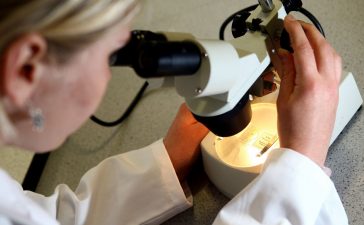UCLA Health is now accepting applications for a new cohort of innovators to be part of its TechQuity Accelerator for 2023, an initiative that supports startups and other fledgling companies with technologies that can improve health equity among underserved and vulnerable patient populations.
Launched in 2022 in response to COVID-19’s disproportionate impact on minority communities, the TechQuity Accelerator strives to strengthen health security by targeting four overall areas: prevention, diagnosis, treatment and community impact.
“Following last year’s highly successful inaugural program, we are excited to launch a new accelerator to support early-stage companies driven by a commitment to develop inclusive technologies and boost health equity within diverse populations,” said Jennifer McCaney, executive director of UCLA Biodesign and associate director of the UCLA Clinical and Translational Science Institute. “We look forward to receiving applications from across our region’s robust tech ecosystem.”
UCLA Health operates the TechQuity Accelerator in partnership with UCLA Biodesign and BioscienceLA, with a laser focus on supporting teams that feature innovative concepts and a mission to improve long-term community health resilience. The four-month program provides selected startups with personalized mentorship, access to clinical expertise and product-development support, culminating in a final pitch showcase with UCLA Health leaders and community stakeholders.
Selected accelerator companies are paired with student interns subsidized by BioscienceLA through its BioFutures Internship Program. This collaboration also represents a shared commitment with UCLA Health and UCLA Biodesign to build a diverse life science workforce by providing career-building opportunities for people from historically underrepresented backgrounds.
For 2023, the initiative seeks companies that have developed solutions to overcome any of the following barriers to more equitable health outcomes:
Healthcare Access – The pandemic strained an existing health system fraught with challenges for people with cultural, geographic or financial limitations to access care and services. Prospective applicants may have innovations in these areas:
- Telemedicine
- Wearables, remote monitoring devices
- Online pharmacies
- Direct-to-consumer healthcare delivery
- Encrypted mobile communication software
- Medical translation and transcription
- Gender-affirming care
Environmental Justice – Traditionally, underserved communities are mostly likely to suffer the health, financial and political consequences caused by global climate change. Prospective applicants might have solutions for:
- Removing, reducing or preventing pollution in vulnerable communities
- Improving access to healthy food options
- Leveraging community leaders to ensure equitable environmental and land-use decisions
- Safe housing and recreational facilities
- Expanding social service programs
Mental Health and Youth Wellbeing – Limited resources are available for low-income residents and adolescent patients to ensure their long-term care and access to mental health professionals. Potential areas of focus include:
- Pediatric healthcare delivery in collaboration with schools
- Broadening medication access for substance-abuse patients
- Teletherapy
- Self-care mobile applications
- Platforms to better identify resources, including mental health experts and treatment centers
For more information or to apply, visit the UCLA Health TechQuity Accelerator website.
UCLA Health is consistently ranked among the nation’s top health systems by U.S. News & World Report and is an emerging leader in innovative, equity-focused healthcare delivery.
UCLA Biodesign strives to train the next generation of healthcare leaders by pioneering innovation and uniting stakeholders across the healthcare ecosystem.
BioscienceLA is a major catalyst for innovation in the life sciences and health in the greater Los Angeles region. The independent, not-for-profit organization was seeded by LA County and is backed by numerous companies, hospitals and organizations.












